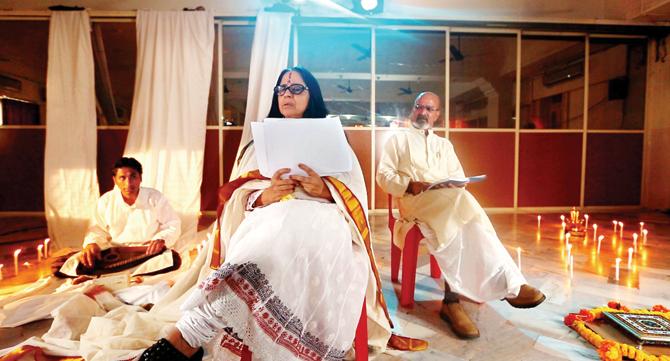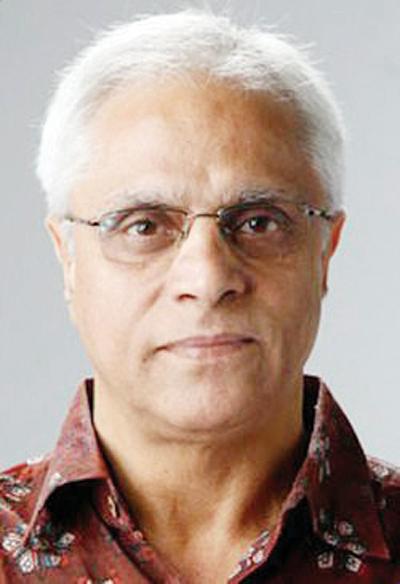Ila Arun and KK Raina bring one of Jon Fosse’s acclaimed plays to stage this week for the first time in India

Surnai Theatre Group rehearses Death Variations by ����Norway��������s next Ibsen������� John Fosse
ADVERTISEMENT
It was 2012 when KK Raina and Ila Arun first got acquainted with the perplexing minimalism of Norwegian writer Jon Fosse. The veteran actors were invitees to the International Ibsen Festival in Oslo, where they found themselves musing if there was a modern practitioner who was as relevant and thought-provoking as Henrik Ibsen, the formidable Norwegian playwright whose work has been adapted by Arun for Indian stages. Inger Buresund, the festival’s managing director, suggested that they read the works of Jon Fosse, and Raina swiftly headed to the nearest bookstore and returned with a bunch of Fosse’s works. The rest, as they say, is history, and arduous stage rehearsals.

Surnai Theatre Group rehearses Death Variations by “Norway’s next Ibsen” Fosse
“I finished reading all six volumes that very night. I was addicted to Ibsen and I am obsessed with Fosse,” admits the award-winning scriptwriter, who has directed Pir Ghani adapted from Ibsen’s Peer Gynt. Under Raina’s direction, the Surnai Theatre Group will stage Fosse’s Death Variations 2001 this week, for the first time in India. Translated from Norwegian by May Brit Akerholt, this play has everything that “Norway’s next Ibsen” is both loved and feared for by theatre directors. It is existential, it is lyrical, it is bare of stage directions, the characters are nameless. If you thought Waiting for Godot is a play where nothing happens, then you haven’t met Fosse.

For Raina, Death Variations is a timeless tale of a couple that tries to understand “what went wrong”. The play presents Older Woman and Older Man as they collect bits of reason to come to terms with their Daughter’s death and look back on her life and their marriage. The play features a tight cast — Vijay Kashyap, Joy Sengupta, Aadya Bedi, Ashish Chawla and Maanvi Gagroo. Arun, who has earlier adapted Ibsen’s Lady from the Sea into the Hindustani play, Mareechika, plays the role of grieving Older Woman, and says there is nothing abstract about Fosse, touted as Samuel Beckett’s lyrical counterpart. “The couple has lost something. And Fosse’s understanding of death is not just physical death. It could be the death of a relationship, the death of communication, the death of an artist’s expression, the death of emotions. There are different kinds of death.”
Drawn by the lyrical language that Fosse uses, Arun also contributes to the play as music director and has brought in Zeeshan Khan, a singer from the celebrated Rampur Gharana. “He is continuously singing our thoughts and highlighting our feelings,” says Arun. Indianising the play, Khan enchantingly sings Miyan ki Malhaar when a character mentions rain,
of which there are several instances through the play.
But, that’s the easy bit. In 2010, Fosse received the Inter-national Ibsen Award, and the committee’s statement highlighted the undramatic quality of his works. “Hard to play” was their flattering comment. “This play has pauses; short pauses and
long pauses. And those are the only stage directions. For an actor, this is a challenge. What do you do with a ‘pause’? And how is it different from a ‘short pause’?” quizzes Raina. But he also feels that Fosse is a liberating playwright, challenging actors to interpret characters that are simply called ‘Daughter’ or ‘Friend’.
While this is a Fosse first in India, Raina staged the 90-minute long play last year at the Ibsen in China festival, for a section called Jon Fosse’s Blossoms. There were other tributes to Fosse, such as A Summer’s Day by the Galiaskar Kamal Tatar State Academic Theatre Kazan, Russia and Dream of Autumn by the Tehran Theatre Workshop.
The pressure was high back then to get Fosse right, and the same is the case now. Having rehearsed for
a month-and-half bet-ween packed schedules, Raina feels it has taught him and the actors to put the unspeakable into words. “Every moment of our rehearsals was tough. If it is new for us actors, it’s surely new for audiences. We are eager to see how Indian audiences react to Fosse.”

 Subscribe today by clicking the link and stay updated with the latest news!" Click here!
Subscribe today by clicking the link and stay updated with the latest news!" Click here!







